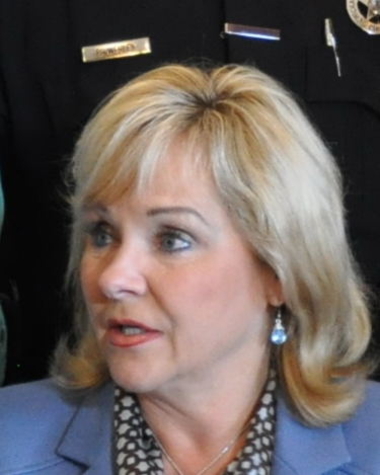Board certifies $900 million hole in Oklahoma budget

Oklahoma City (AP) — Gov. Mary Fallin said Monday she will push for the Legislature to reduce hundreds of millions of dollars' worth of tax breaks and money that's diverted for things like transportation and education to help offset an estimated $900 million hole in next year's state-appropriated budget.
Fallin made the comments just moments after the Board of Equalization she chairs formally certified the Legislature will have $900.8 million, or nearly 13 percent, less to spend in Fiscal Year 2017, which begins July 1.
State finance officials also informed the board of a revenue failure for Fiscal Year 2016, which will result in automatic budget cuts to schools, health care and other state agencies from January to June. Fallin's Secretary of Finance Preston Doerflinger says those cuts likely will range from 2 to 4 percent.
"There's a great need for us to address the structure of the state budget itself so that we can prioritize the money where we want it to go, such as education, health care, certainly corrections, roads and bridges," Fallin said.
Fallin and legislative leaders have repeatedly called for changes in the funneling of so-called off-the-top money, which is revenue that is not appropriated by the Legislature. Over the years, it has been diverted by previous Legislatures to go directly to pay for things like road and bridge construction, public schools, college scholarships and shoring up the state's pension systems.
"A lot of our agencies have lost anywhere from one-fourth to one-third of their budgets, but those off-the-top entities haven't," said House Speaker Jeff Hickman, R-Fairview. "They get their money off the top, paid in full, and they have never felt any of this pain like a lot of our agencies."
Last fiscal year, for example, about $293 million was diverted to the Teachers' Retirement Fund, $723 million went directly to fund state road and bridge construction, and another $675 million went directly into various funds dedicated to public schools, according to the Office of Management and Enterprise Services.
Hickman said the percentage of overall state revenue collections available for the Legislature to appropriate has decreased from about 55 percent in 2007 to 45 percent today.
Much of the reduction in state collections is tied directly to plunging oil and gas prices and the ripple effect of the energy industry's decline on other revenue sources like sales and income taxes. But lawmakers also have implemented policy decisions in recent years, like tax cuts and incentives and the diversion of off-the-top revenue, which is affecting collections as well.
Lawmakers also will see a reduction in available revenue as a result of a reduction in the state's individual income tax rate from 5.25 percent to 5 percent, beginning Jan. 1, that will cost the state about $147 million annually when fully implemented.
A second income tax cut, from 5 percent to 4.85 percent, will go into effect if revenue collections grow by enough to offset the lost revenue, and neither Fallin nor Hickman committed Monday to stopping that cut from taking place.
Fallin said any plan to delay or stop the second income tax cut would have to be made by the Legislature.
"I'm not saying I would be for or against it," Fallin said, "but I think we need to have all areas of discussion on the table right now."
By Sean Murphy, Associated Press. Copyright 2015 The Associated Press. All rights reserved. This material may not be published, broadcast, rewritten or redistributed.
The Gayly – December 22, 2015 @ 7:20 a.m.





